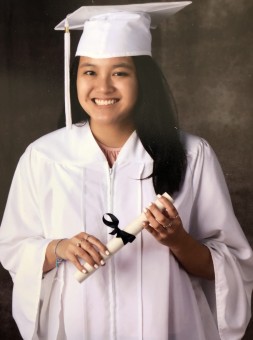
Name: Kiarra R Villaraza
From: Chicago, IL
Votes: 0
Dry
erase markers of every color are sprawled out on the Innovation Lab
floor as ideas are floating in the air, but the members of Team
Ideation remain discouraged. Team Ideation, a team I founded at the
start of junior year, consists of five girls competing in the
‘Technovation Challenge’. The challenge is an all-female
international competition that focuses on creating a program that
solves a real-life issue within a community.
Finding
an idea to center our project proved to be quite the obstacle. One
day while gazing at the window sill, I saw an excessive amount of
random 3D printed objects and came to the realization we could be
utilizing the printer for a more focused purpose. This birthed the
idea to create our own passive prosthetic models, providing an
innovative solution for children in need.
To
further my knowledge on the use of prosthetics today, I completed
extensive research, looking at multiple articles and videos, which
led me to discover the unfortunate reality of many low-income
families with prostheses children: prosthetics are considered a
luxury to many families due to their high cost. A chord struck in my
heart. It was difficult to fathom how a prosthetic limb was not
easily accessible to families for their prostheses children.
Inspired
by the information we gathered, my team established Helping Hand, a
non-profit organization that creates affordable prosthetics for
low-income families utilizing 3D printing technology. Quickly taking
on the role of Team Captain, I delegated tasks amongst the team and
carefully devised a plan to tackle this issue. I decided it would be
best to create prototypes of passive prosthetics. Working closely
with my team members, we printed and assembled the various parts of
the hand and, to date, we have successfully created six prosthetic
hands.
Wanting
the children to feel excited about wearing their prosthetic and stray
away from feeling ashamed, we offered different colors of filament so
they could personalize them however they wanted. Our coding team
created an app to assess family eligibility for a prosthetic. The app
would also house information regarding our prosthetics and the
process families would go through to receive them.
Once
we felt we were ready to apply our work, letters about our mission
and journey were sent in hopes of finding a recipient for our
prosthetics. After reaching out to as many as 14 local hospitals,
rehab centers, and support groups, I am proud to say we are in the
process of working with several families. We have planned
consultations regarding meeting the family, fitting for the
prosthetic, and post checkups.
Working
on Helping Hand throughout my high school experience has inspired me
to continue this work when I get to college, where I feel the
resources are greater to reach more families. Furthermore, my dream
is to tackle this issue internationally, bringing our prosthetics
overseas to reach children in less fortunate areas of the world.
Throughout
this journey, my eyes have been opened to how many luxuries we as a
society take for granted. A luxury can be as simple as completing
normal everyday tasks without difficulty. Helping Hand brought to
light the pertinent questions I so often overlooked: How are
prostheses children affected by this? Are their lives limited because
they cannot complete normal everyday tasks? Are the families
suffering because they are unable to provide for their children? My
answers to these questions have changed dramatically and I have
concluded that to understand them, we must empathize with others. To
truly empathize with others, we need to step out of our own shoes and
begin to walk in the shoes of others. Only then can we truly
recognize the underlying issues our society faces and develop
effective solutions.